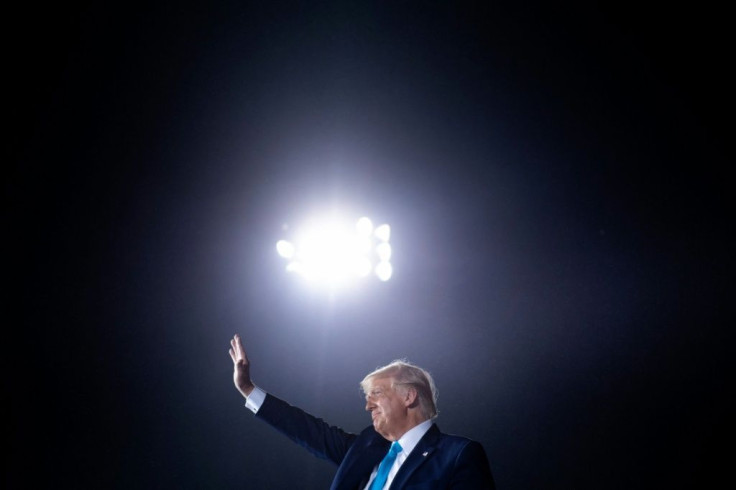Key Questions About The Trump Tax Revelations
US President Donald Trump has cast himself as a billionaire but The New York Times reported he is deeply indebted and used accounting maneuvers to pay little or no federal taxes in recent years.
The Times' scoop, which it says is based on Trump's long secret tax returns, reported that Trump paid only $750 in federal income tax in 2016 and 2017, and none at all for 10 of the previous 15 years.
The report hands precious new ammunition to Trump's November election rival Joe Biden, and provides insights into just how the New Yorker transformed into a globally known mogul:
Trump always boasted his money came from real estate, but the Times report paints a more nuanced picture.
Between 2000 and 2018, he earned $230 million for licensing his name to hotels in Azerbaijan and Turkey, as well as from products ranging from cookies to mattresses.
A big earner was his image-defining reality show "The Apprentice," from which the Times says he made $197.3 million, while investments in real estate projects -- mainly two office buildings managed by Vornado Realty Trust -- made him $178.7 million.
But businesses managed directly by Trump, including a skating rink in New York's Central Park and the Mar-a-Lago resort in Florida, lost $174.5 million over the same period.
While his New York properties Trump Tower and Trump World Tower have both proven profitable, Trump-branded golf courses in Scotland, Indonesia, Florida and elsewhere have turned into big money losers for the president, to the tune of $315 million.
"Trump runs his real estate business when the times are good, and he seems to be very unqualified to run them when times get tough," said Kevin Riordan, a real estate finance professor at Montclair State University.
Fortune magazine estimated Trump's wealth as $2.5 billion in September, but the magazine said the coronavirus pandemic has cost him $600 million this year as both the value of his office space and guest traffic to his hotels have fallen.
Perhaps Trump's greatest asset is his name, which Forbes valued at $56 million, less than its $80 million valuation in 2019.
During his first campaign for office in 2016, Trump referred to himself as the "king of debt" and the Times reports indicates how heavy that crown may lie.

The president is personally responsible for loans and other debts totaling $421 million, most of which come due in the next four years. The Times reported he hasn't paid down a $100 million mortgage on commercial space in Trump Tower, which is to be repaid in 2022.
There is also evidence that Trump is not in a financial state to settle to those accounts.
His core businesses had lost some $100 million in the two years prior to 2015, and he lost lucrative sponsorship deals over remarks decried as racist during the 2016 election campaign.
The Times report does not specify who Trump owes money too, and a series of bankruptcies in the 1990s means many financial institutions avoid him.
"Not only do the people that own Trump's debt have leverage over him, but the people that know about it have significant leverage over him," said Donald Sherman, deputy director of Citizens for Responsibility and Ethics in Washington.
The Times report gives numerous examples of Trump taking generous writeoffs for business expenses and taking advantage of federal tax incentives, some enacted after the 2008-2010 global financial crisis.
He used heavy losses on his properties to avoid paying tax on income over the past decade, because the US tax code allows business owners to carry over leftover losses to reduce taxes in future years.
The law also permits real estate developers like Trump to use losses to offset gains in other activities, an issue at the heart of a fight between Trump and the Internal Revenue Service over a refund of $72.9 million on income tax Trump paid between 2005 and 2008.
While not all the details are known about the refund battle, the Times points to evidence that suggests Trump's defense relates to $700 million in losses from his Atlantic City businesses, with which he cut ties in 2009.
Key elements of Trump's accounting appear to be compliant with US law but the report does raise questions about certain practices.
These include the Trump Organization's $747,622 payments to a consulting company co-owned by the president's daughter Ivanka Trump -- who was herself an officer of the Trump Organization.
In another case, Trump classified the Seven Springs estate in New York state as an "investment property" rather than a personal residence, taking $2.2 million in business expense writeoffs.
But to qualify for these writeoffs, the venture must generate income or be managed in a way intended to be a viable business, and Trump family members have repeatedly described the site as a family compound.
© Copyright AFP {{Year}}. All rights reserved.





















